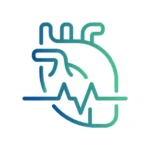
Cardiology is the study of the heart and the system that moves blood around your body—called the circulatory system. It looks at how the heart works and finds out what’s wrong when it doesn’t.
Doctors who practice cardiology understand how to treat heart problems. This includes both short-term issues like chest pain or a fast heartbeat and long-term diseases like heart failure. They also help people who have already had heart attacks recover and live better lives.
Think of the heart like a pump. If any part of the pump breaks or gets clogged, it won’t work right. Cardiology helps fix these problems so your body gets the blood it needs.
🫀 Main Idea: Cardiology is all about keeping the heart strong and fixing it when it’s weak or damaged.
Cardiology involves a lot of things. It starts with asking about your symptoms—like chest pain, breathlessness, or tiredness. The doctor may check your pulse, listen to your heartbeat, or order tests to learn more.
After diagnosis, they might give medicine, suggest changes to your diet and lifestyle, or do a procedure to fix the issue. For serious problems, they may use surgery or special tools like a pacemaker.
It’s not just about treating problems. Cardiology also helps people avoid them in the first place. That includes helping patients quit smoking, lose weight, and lower their blood pressure.
🩺 What Cardiologists Do:
Prevent future heart issues
Here are some common conditions that cardiology helps with:
Each of these problems can be dangerous if not treated early. But the good news is that many can be managed or even prevented.
🚨 Remember:
Cardiology offers many treatments depending on your condition. Some are simple, like lifestyle changes. Others may involve medicine or surgery.
Here are a few common treatments:
Some people may also get special devices like pacemakers to keep the heart beating regularly.
💊 Treatment Goals:
Help you live a longer and healthier life
Cardiology helps with many heart and blood vessel issues. Here are some conditions commonly treated:
These issues can happen to anyone—young or old. That’s why regular heart health checks are important, especially if heart disease runs in your family.
📝 Helpful Tips:
Eat less salt and sugar
Cardiology uses several procedures to check and fix heart problems. These are often safe and effective.
Some common procedures:
Many of these are done using tiny tools and don’t need large cuts, which helps patients recover faster.
🛠️ Why These Matter:
They reduce symptoms like pain or breathlessness
To find out what’s wrong with the heart, cardiologists use different tests. These tests are safe and often painless.
Here are some tests:
These tests help doctors find problems early and plan the best treatment.
🧪 Test Benefits:
Guide future treatment
The heart is one of the most important parts of your body. Taking care of it should be a top priority. Cardiology helps diagnose, treat, and prevent heart problems. Whether you feel fine or have symptoms, it’s always a good idea to check in on your heart health.
With the right knowledge, care, and support, most heart problems can be managed. Don’t wait until it’s too late—listen to your heart, literally and figuratively.
❤️ Call to Action:
A cardiologist checks how your heart is working. They ask about your symptoms, do tests like ECG or blood pressure checks, and give treatments. They help with things like chest pain, high blood pressure, or irregular heartbeat. They also guide you on how to stay healthy and avoid future heart problems.
Cardiology treatments depend on the heart issue. You may get medicine, diet advice, or be asked to change your lifestyle. Some people need a simple procedure, like putting in a stent. Others may need surgery. The goal is to make your heart stronger and reduce your risk of heart attack or stroke.
Heart blockages are often treated with angioplasty. In this procedure, a small balloon is used to open the artery, and a stent (a tiny mesh tube) is placed to keep it open. Some people may need bypass surgery. Medicines and a healthy lifestyle are also important for managing blockages.